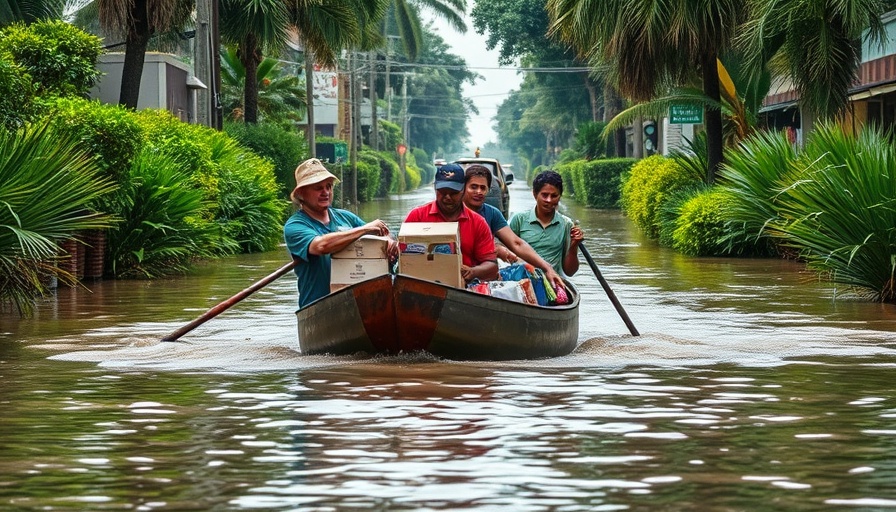
Understanding Human-Caused Climate Change: A Local Perspective
Climate change isn't just a distant issue affecting faraway places; it's happening right now in Kansas City and it influences our health, environment and economy on a daily basis. With the science behind human-caused climate change becoming increasingly clear, we must prioritize understanding its impact locally and how we can respond.
Earth's Climate: A Historical Context
For over 800,000 years, Earth's climate has naturally fluctuated between warm and cold periods, driven by variations in the planet's orbit and solar energy. However, the current pace of climate change is alarming. According to NASA, our planet is warming at an unprecedented rate, unlike anything we've seen in the last 10,000 years. The historic ice ages feel like a world apart from what we face today—a rapid increase in global temperatures as a result of human activity.
The Direct Evidence of Change
Scientists rely on a vast array of data—from ice cores to tree rings—to piece together the story of our climate. The evidence is overwhelming: a surge in greenhouse gases caused by activities such as burning fossil fuels and deforestation is reshaping our environment. In Kansas City, we can notice changes in weather patterns, with more intense storms and unpredictable temperatures, which have implications over local health—a topic that resonates deeply with residents and businesses addressing wellness and fitness.
How Human Activities Factor In
Local actions have a global consequence. Our everyday activities—including energy consumption, vehicle emissions, and land-use changes—are driving up greenhouse gas levels. Pre-industrial carbon dioxide levels were around 280 parts per million; today, they're over 414, marking an increase that’s roughly 250 times faster than natural changes in the past. This alarming shift means that our personal choices—like how we commute or what sources of energy we utilize—play a crucial role in global climatic trends.
Science and Consensus: Moving Beyond Debate
While debate and skepticism may persist in casual conversation, the scientific community is united in its conclusions: human actions are the primary driver of climate change. Organizations like the Intergovernmental Panel on Climate Change provide a consensus that we can no longer ignore. The call to action is strong; climate change is not just an environmental concern, but also a public health crisis that demands local attention.
Relevance to Kansas City: Health and Wellness Implications
As climate change accelerates, its impact on public health in Kansas City becomes more pronounced. Increased heat waves and changed precipitation patterns heighten risks such as heat-related illnesses and waterborne diseases. Health resources are adapting to meet these challenges, with local wellness experts emphasizing the importance of community hydration stations and air-conditioned spaces during extreme weather events. Additionally, mental health resources are crucial, as the stress of environmental anxiety grows among residents.
Creating a Local Network for Change
Community involvement is key in combating climate change. Kansas City offers a wealth of resources—from local wellness events to fitness centers and nutrition programs that encourage sustainability. Participating in these activities not only enhances individual health but also contributes to a collective effort against climate change. This is increasingly relevant in an era where holistic health methods are becoming prominent. Practicing yoga at KC studios or joining local fitness classes can also enhance one’s physical and mental resilience—important traits as we navigate through these climate-induced challenges.
Practical Steps to Combat Climate Change Locally
Understanding the root causes of climate change can empower individuals and businesses to take action. Here are some practical steps:
- Switch to renewable energy sources when possible—using solar panels can be a great investment for homes and establishments.
- Adopt greener commuting options like cycling or using public transportation, which help reduce personal carbon footprints.
- Engage with local health and wellness events that focus on sustainable practices—this fosters community while promoting healthy living.
- Educate others about climate change impacts and share resources related to mental and physical health influenced by environmental conditions.
- Join local advocacy groups that support policies aimed at combating climate change.
Your Role in the Climate Conversation
As local residents and business owners, understanding climate change is crucial not just for personal wellness but also for community heritage and future prosperity. Our local environment, economy, and quality of life are intertwined with the planet's health. Climate change is urgent, and by taking steps toward sustainability and health promotion, we can create a better living environment for everyone in Kansas City.
Conclusion: Collective Action for a Healthier Kansas City
To nurture a sustainable and healthy future for ourselves and generations to come, knowing about climate change and its health ramifications is just the beginning. We can make impactful changes within our community by staying informed and proactive.
 Add Row
Add Row  Add
Add 





Write A Comment